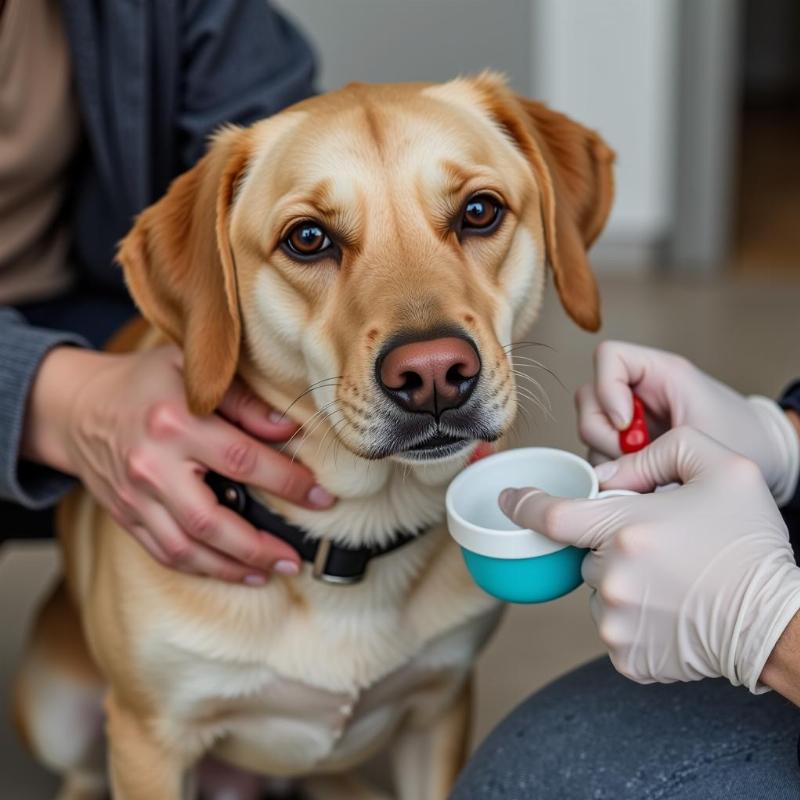If your dog is acting weird after vaccination, you’re not alone. Many dog owners in the US notice changes in their furry friends after their shots, ranging from mild lethargy to more concerning symptoms. Understanding what’s normal and when to seek veterinary attention is crucial for ensuring your dog’s well-being. This article will guide you through the common post-vaccination behaviors, potential side effects, and when it’s time to call your vet.
Changes in behavior after vaccination are often a dog’s natural response to the vaccine. Think of it like a mini-version of the illness the vaccine is protecting against. Their immune system is kicking into gear, and this can manifest in various ways. While some reactions are typical and subside quickly, others might warrant a closer look. So, how do you differentiate between normal post-vaccination behavior and something more serious? Let’s dive in.
Common Post-Vaccination Behaviors
Many dogs experience mild side effects after vaccination. These are usually nothing to worry about and resolve on their own within a day or two. Common behaviors include:
- Lethargy: Your dog might seem more tired than usual and prefer to sleep more. This is often the most common reaction.
- Soreness at the injection site: Some dogs may experience mild pain or discomfort where they received the injection. They might lick or avoid being touched in that area.
- Decreased appetite: A temporary loss of appetite isn’t unusual.
- Mild fever: A slight increase in body temperature can occur.
These mild reactions are generally temporary and indicate that the vaccine is doing its job – stimulating the immune system to build protection. However, if these symptoms persist for more than 48 hours or worsen, consult your veterinarian.
When to Worry: Recognizing Potential Side Effects
While most reactions to vaccines are mild, some dogs can experience more significant side effects. It’s important to be aware of these potential reactions so you can seek timely veterinary care if necessary. These more serious signs include:
- Facial swelling: Swelling around the face, especially the muzzle or eyes, can be a sign of an allergic reaction.
- Difficulty breathing: Labored breathing or panting excessively could indicate a serious allergic reaction.
- Vomiting or diarrhea: While a single episode of vomiting or diarrhea might not be alarming, repeated instances require veterinary attention.
- Hives or skin rash: These are often signs of an allergic reaction.
- Collapse or seizures: These are rare but severe reactions and require immediate veterinary intervention.
If you observe any of these signs, contact your veterinarian immediately. Prompt treatment is crucial in managing these reactions effectively.
Minimizing Discomfort After Vaccination
There are a few things you can do to help your dog feel more comfortable after vaccination:
- Provide a quiet and comfortable resting place: Let your dog rest and recover in a calm, familiar environment.
- Offer fresh water: Ensure your dog has access to plenty of fresh water to stay hydrated.
- Monitor the injection site: Keep an eye on the injection site for any excessive swelling, redness, or discharge.
- Avoid strenuous activity: Limit exercise and playtime for a day or two following vaccination.
- Follow your veterinarian’s instructions: Your vet may recommend pain medication or other supportive care.
 Owner Caring for Dog After Vaccination
Owner Caring for Dog After Vaccination
Conclusion: Monitoring Your Dog After Vaccination
Observing your dog for any unusual behavior after vaccination is essential. While most reactions are mild and temporary, recognizing potential side effects is crucial for ensuring your dog’s health and well-being. By understanding the difference between normal post-vaccination behaviors and more serious reactions, you can make informed decisions and seek appropriate veterinary care when necessary.
FAQ:
- How long do side effects from vaccines typically last? Most mild side effects resolve within 48 hours.
- Can I give my dog pain medication after vaccination? Consult your veterinarian before giving any medications.
- What should I do if my dog’s injection site is swollen? Monitor the site and contact your vet if the swelling is excessive or accompanied by other symptoms.
- Are all dogs likely to experience side effects after vaccination? No, not all dogs will experience side effects.
- Can vaccines cause long-term health problems in dogs? Serious long-term side effects are rare.
- Should I delay or skip vaccinations if my dog has had a reaction in the past? Discuss your concerns with your veterinarian to determine the best course of action.
- Are there alternative vaccination schedules available? Talk to your vet about different vaccination protocols.
Related Articles:
are dogs tired after vaccinations, lump on dog from vaccine, bump on dog after vaccine, dog acting weird after shots, dog acting weird after distemper shot
Beautdogs.us is your leading resource for comprehensive dog care, breed information, and top-quality products. We’re dedicated to empowering dog owners across the US with expert advice and resources, catering to both new and experienced pet parents. From understanding your dog’s behavior after vaccination to finding the perfect breed for your lifestyle, Beautdogs.us is your trusted partner in navigating the joys and responsibilities of dog ownership. Contact us today for personalized guidance: Email: [email protected], Phone: +1 501-555-7529.